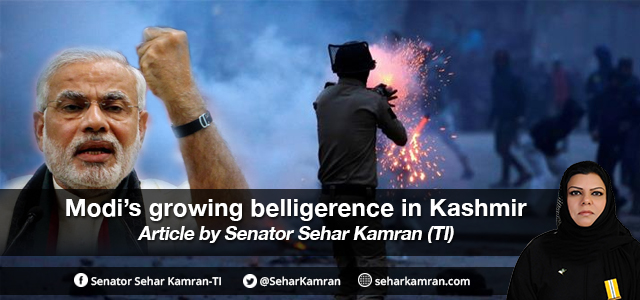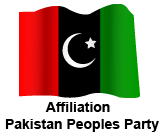By Senator Sehar Kamran (TI)
July 18, 2018
 A series of recent events has not only rocked the Indian Occupied Kashmir (IOK), but has brought the sad state of human rights in the valley to the forefront once again. With the assassination of Shujaat Bukhari, a senior Kashmiri journalist and editor-in-chief of a leading English newspaper, ‘Rising Kashmir’, the imposition of the governor rule in IOK as well as the publication of United Nations Human Rights Council (OHCHR) report has brought Kashmir in international spotlight. The UN expressed grave concerns over India’s violation of human rights in the colonized territories of Kashmir. It has unmasked the true face of the secularism in the biggest democracy of the world. These events mark the latest occurrences in a long list of controversies beginning with the Kathua rape case to strike the Modi Administration’s beleaguered government in the disputed territory of Jammu & Kashmir.
A series of recent events has not only rocked the Indian Occupied Kashmir (IOK), but has brought the sad state of human rights in the valley to the forefront once again. With the assassination of Shujaat Bukhari, a senior Kashmiri journalist and editor-in-chief of a leading English newspaper, ‘Rising Kashmir’, the imposition of the governor rule in IOK as well as the publication of United Nations Human Rights Council (OHCHR) report has brought Kashmir in international spotlight. The UN expressed grave concerns over India’s violation of human rights in the colonized territories of Kashmir. It has unmasked the true face of the secularism in the biggest democracy of the world. These events mark the latest occurrences in a long list of controversies beginning with the Kathua rape case to strike the Modi Administration’s beleaguered government in the disputed territory of Jammu & Kashmir.
Ever since Modi took over as the Prime Minister of India, he has pursued a muscular approach vis-à-vis IOK, using unrestrained use of force against the civilians. These four major events i.e. assassination of Shujat Bukhari, imposition of governor rule, Kathua rape case, and latest UN report has shaken the world and focused international attention towards the plight of Kashmiri peoples. In addition to the continuous human rights abuse, use of force and pellet guns, for once, are not being met with a deafening silence. And while it is certainly possible to frame the current furor within the context of a larger ongoing conversation inside India on the rise of Hindutva, intolerance towards minorities and increasing state sponsored communal violence, Modi’s government’s response has been lack-luster in the specific context of Kashmir.
Kashmir, in fact, has been hurtling from one crisis to another in the past four years. Modi’s Kashmir policies have become subject to increasing criticism and scrutiny, both at home and abroad, where some local analysts have gone so far as to term them as barbaric, because of the indiscriminate use of force against civilians in attempts to squash the indigenous freedom movement in the valley especially in the last two years following the martyrdom of Burhan Wani, a Kashmiri youth. As a result, these oblivious policies have created new heroes that gave new life and face to Kashmiri struggle.
As indicated by the first-ever United Nations report on human rights in Kashmir, which acknowledged the Indian aggression in trying to curtail the dissent against its illegal occupation of the valley through worst kinds of human rights violations. It also highlights a wide range of human rights violations in the IOK ‘ranging from lack of access to justice to sexual violence to torture to enforced disappearances to arbitrary arrests and detention to name few among many’. Needless to say this UN report was rejected by India, but it has reaffirmed Pakistan’s long sought position on Indian atrocities in the Kashmiri valley.
Under the Modi regime, Indian security forces upped the ante in Kashmir by imposing curfews, clampdowns and vehemently using pellet guns to suppress the indigenous and humanitarian struggle for independence and self-determination. Indian political and military junta are still under the false impression that they can subjugate the Kashmir struggle through use of ‘Goli Ki Zuban” (the language of bullets), blinding the women and children and massive killings of young Kashmiri populations, but what they forgot was the resistance of the Kashmiris especially the new generation of the youth who has grown up under the Indian curfews and indiscriminate violence against civilians. The trigger point of this new wave was the martyrdom of Burhan Wani in 2016, at the hands of Indian security forces, rebranded the cause and uplifted the plights of the people of occupied Jammu and Kashmir.
After Wani’s death, civilians in the IOK flocked in the streets to protest against the occupying Indian forces. As a result, India stepped up its indiscriminate use of kinetic force and carried out more than 1,500 operations in the held territory resulting in the martyrdom of 534 innocent Kashmiris. Moreover, 21,183 people were wounded, 8,424 lost their sight due to use of pallet guns and 19,230 were detained.
Unable to curtail the ingenious freedom movement and divert attention from the worsening humanitarian conditions in the IOK, PM Modi and his regime has been employing dangerous tactics such as to shift the onus on neighbouring country to appease their public domestically. The case in point is a drama of ‘surgical strikes’, hatched by Modi to recover his rapidly decreasing approval rating, failure to deliver his social and economic promises of ‘Ache Din’ (good days) and win state elections.
When Narendra Modi took oath as the PM of India in 2014, the possibility of these dangerous manoeuvres to destabilize the fragile balance in South Asia were expressed by all those who were familiar with Modi’s style and history (relations with RSS) lost hope for peace and tranquillity in South Asia. Throughout his electioneering campaign, Modi spouted hatred against Muslims in general and Pakistan in particular. Similar pattern is expected to be repeated in India’s 2019 elections where anti-Pakistan rhetoric will be at the crux of Indian political party’s campaigns taking away any possibility of a dialogue between the two neighbouring arch-rivals.
Kashmir is often described as a “nuclear flashpoint” in South Asia. It is vital that international community plays its role and stops the Indian belligerence in Kashmir before instability there reaches the point of no-return. So far the muted international responses apart from the United Nations (UN) and Organization of Islamic Cooperation (OIC) reports towards the continuous human rights abuses by the Indian forces have been disappointing, but they expose the duality of international community and human rights organizations where it seems that time and again economic and political gains will trump humanitarian concerns.
Indian disregard for the 2003 ceasefire agreement, growing impunity inside IOK, combined with the statements from Indian army and Airforce chief to fight a “two front war” and “locate, fix and strike targets across the border” are pointing towards Modi’s thrust for ‘blood’ and ‘war’.
Without doubt, the security situation inside IOK and on the Line of Control (LOC) are rapidly deteriorating; and has the potential to escalate. It is high time for international community, international human rights organizations and above all, UN, United Nations Security Council (UNSC) and OIC to take note of ethnic cleansing of Kashmiri people and for this, Indian leadership should be held accountable for their crimes against the humanity. Indian political and military establishment must keep in mind that their inhuman tactics and brutal force will not suppress the Kashmir’s indigenous political struggle for self-determination.
Same version of the article appeared in The Nation


